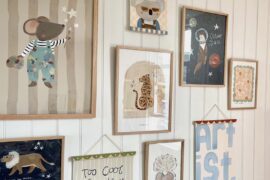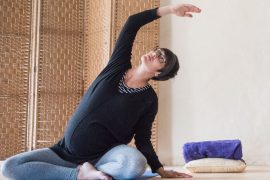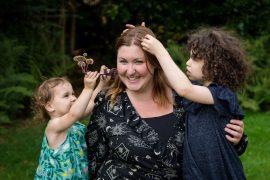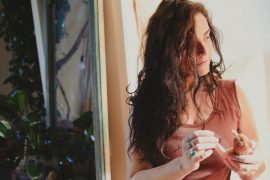By Michele Powles. This is an excerpt about postnatal depression and anxiety from the book “When We Remember to Breathe“.
Fearful of the night
After a week of being overwhelmed, I have been taking stock. I have been looking up more. Breathing out more. Being grateful that it is a sunny day.
It’s a good reminder; it’s not always easy to find the happy in such simple pleasures.
I remember sitting on the couch with my firstborn – him tucked, tiny and warm, in my arms – and seeing the midwife look at me sharply when I spoke about feeling disappointed that I’d ended up in emergency surgery during his birth. I cried. She watched harder, looking for signs that this wasn’t just a passing display of sorrow. (I think of you at work with all those babies and mothers, and guess this is something you do a lot – the looking and checking and guessing.) In my case, my midwife was looking to see if my tears might come to dictate the next months of my life, turning into postnatal depression and anxiety.
I was lucky. They didn’t.
Instead, some months later, I watched my strong, fearless friend dissolve under the weight of her own anxiety and depression. Her shell melted, that’s what it seemed like from the outside – the thing that had held her together just let go, as the nights pressed down on her and her brain refused to switch off. She became fearful of the night. Instead of sleeping, she tumbled into a long, silent tunnel of doubts that seemed like it would never end; her serotonin raced lower and lower, and the cocktail of neurotransmitters we all possess changed and altered her reality.
In retrospect, there were probably signs she was heading into darkness, and we all missed them: the baby was breach and my friend is naturally anxious; she didn’t feel listened to when things started to go wrong and the birth didn’t go as planned. But, in the tumble that is childbirth, this all seemed like the mess of normal life. Because this is the one unifying thing we return to again and again, isn’t it? The mess of parenting, the scramble to just get through the day without anyone dying.
She became fearful of the night. Instead of sleeping, she tumbled into a long, silent tunnel of doubts that seemed like it would never end…
But it was more than that for my friend. I didn’t see that her expectations and secret fears about motherhood had ratchetted her natural anxiety to breaking point – no one did. Because she didn’t want them to.
I remember so clearly watching it all unfold from the outside. I remember the phone calls and the tears and that she was so lost – so utterly alone and lost despite having people around her to help. Despite that this baby was adored and so, so cherished. I sat in her lounge and held her baby while mine played on the floor. I put both babies down and held her while she dissolved again and again. I thought that was what I was supposed to do. I thought that was all I was supposed to do.
I was wrong.
Her doctor told her that she had postnatal depression at her child’s six-week check-up. She didn’t believe him. Wouldn’t: there was no darkness, no dread or terror. But he was right. And when she finally allowed herself to return to him, her doctor gave it to her straight: she needed medication and she needed it now.
He was right.
Light returned. She slept. Her life changed.
When I think back to that time, I first remind myself that I am lucky: that I am loved and held and that when I slid out the end of pregnancy, my serotonin levels were in good order.
Still. Although I am not one of the almost fifteen percent of New Zealand mums to be diagnosed with postnatal depression, that doesn’t mean I have been immune to the pressures of life coming at me. Despite privilege, despite serotonin – sometimes – life has a way of getting us with a left hook in the gut, right when we least expect it.
You and I have talked about the house build, that thing so many people seem to do when they already have the big life stressors of small children or looming birth. And I’ve hinted at the pressure of writing about the process on a national stage: each week, putting a slice of myself up for people to celebrate, or, as is so often the case, tear down in the comment section of the newspaper. But I didn’t tell you about the fallout.
Today, thinking about my friend – about the crushing reality of depression – I allow myself to be real about that building time. It wasn’t pretty.
I say it again: I am privileged. We are so lucky. So very lucky. We have the money to build a house, my husband and I have paid work, we have the skills to participate in our build and enable us to afford something many others can’t. We have a beautiful family, full of love.











